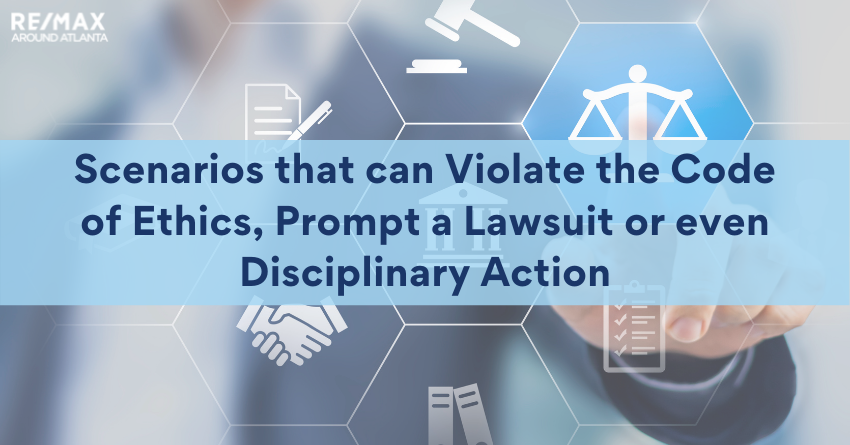|
The Fair Housing testers are out looking for violators in Georgia. Testers are often sent out in pairs – a white tester and, later, a minority tester. Both will be looking for housing with the same criteria and must be treated equally. Don’t be one of the unfortunates that gets tested and fails! If you fail the fair housing test, you could lose your license to sell real estate!
Fair Housing laws make it illegal to steer buyers to or away from given areas based on race, religion, nationality, sex, color, handicap and familial status.
Ask safe questions! A few examples: Do you prefer a single story or a two-story home? A new home or an existing home? A detached home or a townhome? What home features are you looking for? How many bedrooms? A yard? A pool? An open floorplan? A basement? What neighborhood features are you looking for? Nearby your work, medical, recreation, extended family? School districts? Walkability? There are many, many questions to be asked. Make sure they are about the property and the buyer’s stated needs and you won’t get into trouble. Stay safe out there!
0 Comments
More and more, we are seeing Temporary Occupancy Agreements (GAR F219) so sellers can remain in their properties post-closing. Here are a few tips for navigating the form.
Maximum Temporary Occupancy is 60 Days The GAR Temporary Occupancy Agreement is designed to cover the Seller remaining in the property for up to 60 days. If the Seller needs longer than 60 days, a lease should be used. The reason is that, if the buyer has purchased as an owner occupant, lenders consider 60 days the cut off for determining whether the owner is an owner occupant or an investor. If the lender determines that the new owner is actually an investor, the new owner would be in default of the loan. The interest rate could increase or, worse, the owner could be accused of mortgage fraud. Tip: Don’t allow a post-closing occupancy to be more than 60 days. Use a lease form if the seller requires more than a 60 day occupancy. More than 60 days may not work if the new owner will be an occupant. Watch Out for Insurance Issues Once ownership of a property changes, insurance coverage changes too. The seller’s owner occupant policy no longer covers the seller. The buyer is now the owner. If there is a flood or a fire, the new owner’s policy covers the real estate, but not the seller’s personal property. Tip: Make sure the seller contacts his insurance carrier for advice regarding personal property coverage during the temporary occupancy. The New Owner is Responsible for Maintenance and Repairs Once the closing takes place, the new owner is responsible for the maintenance and repair of the property. The previous owner is not. The old owner is just a tenant. Unless the old owner has damaged the property beyond normal wear and tear, they are only responsible for their own personal property. Tip: Advise your buyers, before they agree to a seller remaining in the property post-closing, that they are responsible for the maintenance and repair of the property post-closing. Make a Hold Over Period Hurt Once the agreed upon temporary occupancy has terminated, a seller that remains in the property is holding over. If the seller doesn’t leave voluntarily, the new owner may have to evict. Evictions cost time and lots of money. Therefore, make the daily cost of holding over a significant one. If the daily cost is minimal, the seller has no incentive to leave. Tip: Include a large per day hold-over fee. Make it hurt. $500 or $1000/day would incentivize a seller to leave on time a lot more than a small fee. Lately, we have been seeing sellers that want to terminate a binding contract that should be headed for a closing. If it happens to you, this is good information to point out to your sellers. Remember, don’t give legal advice. Just point out the contract provisions below.
There are, indeed, substantial risks to the seller. The GAR Purchase and Sale Agreement, once fully executed and binding, is a firm contract with clear terms, duties and performance responsibilities of both parties. If there are no remaining contingencies or conditions that would prevent closing, the seller is obligated to sell and the buyer is obligated to buy. A seller who then chooses to terminate, is in default of the Agreement. The consequences of a default by a seller are detailed in the GAR Purchase and Sale Agreement on page 5, Paragraph 2. Default. There are include Buyer Remedies, Broker Remedies and Attorney’s fees. The relevant language is copied here. Paragraph 2. Default b. Remedies of Buyer: In the event this Agreement fails to close due to the default of Seller, Buyer may either seek the specific performance of this Agreement or terminate this Agreement upon notice to Seller and Holder, in which case all earnest money deposits and other payments Buyer has paid towards the purchase of the Property shall be returned to Buyer following the procedures set forth elsewhere herein. c. Rights of Broker: In the event this Agreement is terminated or fails to close due to the default of a party hereto, the defaulting party shall pay as liquidated damages to every broker involved in this Agreement the commission the broker would have received had the transaction closed. For purposes of determining the amount of liquidated damages to be paid by the defaulting party, all written agreements establishing the amount of commission to be paid to any broker involved in this transaction are incorporated herein by reference. The liquidated damages referenced above are a reasonable pre-estimate of the Broker(s) actual damages and are not a penalty. d. Attorney’s Fees: In any litigation or arbitration arising out of this Agreement, including but not limited to breach of contract claims between Buyer and Seller and commission claims brought by a broker, the non-prevailing party shall be liable to the prevailing party for its reasonable attorney’s fees and expenses. The potential costs of a seller default are significant. In this very strong seller’s market, a buyer has multiple reasons to elect to sue for specific performance: the uniqueness of the property, low inventory of similar homes in the market, difficulty of winning another house and rising home prices. Should an action for specific performance be successful, not only would the seller be forced to sell, the seller would also be required to pay the buyers’ attorney fees and expenses of litigation. Fees for both the seller’s and the buyer’s attorney fees can be extremely enormous. Litigation counsel can charge $500 or more per hour. If the parties decide to settle rather than litigate, the settlement can be extremely high as well. We recently had a seller termination in which the buyers and sellers settled in lieu of a suit for specific performance for $200,000. In this market, it is unlikely that the buyer will walk away with only the return of earnest money. As stated in Paragraph c. (above), full listing and seller broker fees are also owed by the seller that defaults. Seek the Advice of Outside Counsel Always encourage a seller considering a default by termination to seek their own legal advice before moving forward. Our experience is that outside counsel will agree and help you get the transaction back on track! - by Mark Moore
Appraisals are interesting right now! We just hosted a great lunch and learn at the Sandy Springs office, and here are a few key takeaways. 1. With so many homes not making it into FMLS or MLS, one of the most important things you can provide to an appraiser is any recent sales that were not in the MLS/FMLS system that have closed or are scheduled to close. They need two sources of data to verify. 2. Appraisers have to “bracket the subject property”. One higher priced, one lower priced. One slightly larger, one slightly smaller. It’s very hard to do with the rate homes have been appreciating. 3. If you are providing comps, they need to be recent (last 3 months), close to subject property, and similar in size, design, finish, etc. 4. Gross living area (GLA) is one of the most important factors to an appraisal. Area below grade (even if daylight on 3 sides) is not allowed to be counted in the GLA of a home. Ideally, the appraiser would find a comp with similar above and below grade square footage. But they can’t comp a 5000 s/f home with 2500ft in a basement, to a 5000 s/f home on a slab where all the living area is above grade. 5. There is a difference in quality of appraisers. Be sure your lender is using top quality appraisers; it will save your clients and you much stress and work! We are happy to answer any further questions from any of you who could not attend! J Just email or call us! Scenarios that can Violate the Code of Ethics, Prompt a Lawsuit or even Disciplinary Action7/8/2021 Scenario 1: The Sellers anticipate that their listing will generate multiple offers. To be fair, the Seller instructs the listing agent to tell showing agents and prospects that the Seller will review all offers at the end of the weekend, on Sunday at 6:00 pm. On Saturday, the Seller receives an all cash offer $100,000 above the list price with no additional terms or contingencies, but the time limit for acceptance of the offer is Saturday night at 6:00 pm. The Seller wants to accept it asap.
Is the Seller obligated to wait until Sunday at 6:00? Would it be a violation of Article 3 of the Realtor Code of Ethics to accept the earlier offer? Article 3 of the Code of Ethics says “Realtors shall cooperate with other brokers except when cooperation is not in the client’s best interest…” We haven’t seen any case law on this, but the general consensus is that the Seller can accept a contract at any time, even if the Seller has previously instructed the listing agent otherwise. Article 3 of the Code of Ethics does allow the exception of when cooperation is “not in the client’s best interests.” So long as the client is calling the shots and not the Realtor®, and there are no Fair Housing issues, the client’s wishes prevail. To cover ourselves and avoid disappointed, angry selling agents and liability for license law and Code of Ethics violations, we should, as Listing Agents, include a statement in private remarks that “The Seller reserves the right to accept offers at any time.” Scenario 2 You list a property as “Coming Soon” with no showings available on the property until the commencement date. The day before the marketing commencement date, a potential buyer without a cooperating agent reaches out to you wanting to see the house ASAP, because they are headed out of town that night. You’d love to earn both sides of the transaction, so you contact the prospect and let them see the property a day before the marketing commencement date. The early prospect’s offer is accepted. You have just violated both the NAR Realtor Code of Ethics and the rules of FMLS. It’s Article 3 again, but in Scenario 2, it is read against the Listing Agent. Realtors are obligated under the Realtor Code of Ethics to cooperate with other brokers, unless it’s not in their client’s best interest. By showing the home yourself a day before publicly stating when it would be available to see, you’ve misrepresented the availability of access to the property and violated the obligation to share information about the property and make it available to other brokers. You’ve also limited the period of marketing of the property, possibly shutting off other, better offers. There is also a truth in advertising component. State law, NAR Code of Ethics and Georgia License Law can all come into play. Both Buyers and Sellers can benefit from a back-up contingency.
For the buyer, it’s a low-risk, high reward situation. The buyer in 1st position may fall out and the property becomes primary. In the meantime, the buyer can continue to look for other property. If another property is located, so long as the Seller has not notified the buyer that the back-up has become primary, the buyer just has to send notice to the Listing Agent of the back-up property that they are terminating and pay the Seller $10.00. (Don’t forget to pay the Seller the $10.00. It’s required.) For the seller, a back-up is insurance that they won’t have to re-market or scramble for a new contract if the first one falls through. Remember that the seller, not the listing agent, must send the notice to the back-up that the contract has become primary. A notice sent by the listing agent is not effective. Remember, too, that before a seller sends notice to the back-up, the seller must be certain that the first contract has been properly terminated. If it has not and notice is sent to the back-up that it is now primary, the seller may find that they are under contract to 2 different buyers. Earnest Money Due Date in a Back-Up Contingency It bears repeating at earnest money delivery is controlled by the purchase agreement. The purchase agreement is a binding agreement, even though it may have a back-up contingency. So, if the agreement says the earnest money is due a certain number of days after binding, then it is due at that time. On the other hand, the buyer can opt for language that earnest money is due after the contract becomes the primary contract. That way, funds are not tied up with a secondary contract. Delivery of earnest money is a point of negotiation, so a seller may require it at binding date. However, delivery at the time a contract becomes primary is not unreasonable. |
RMAAReal Estate News, Brokers Blog & More Categories
All
Archives
July 2024
|







 RSS Feed
RSS Feed